#60yearsofJamesBond: Die Another Day
In the next part of this series looking back through the history of the Bond films, I take a look at Pierce Brosnan's final film - and one of the most controversial in the franchise's history.
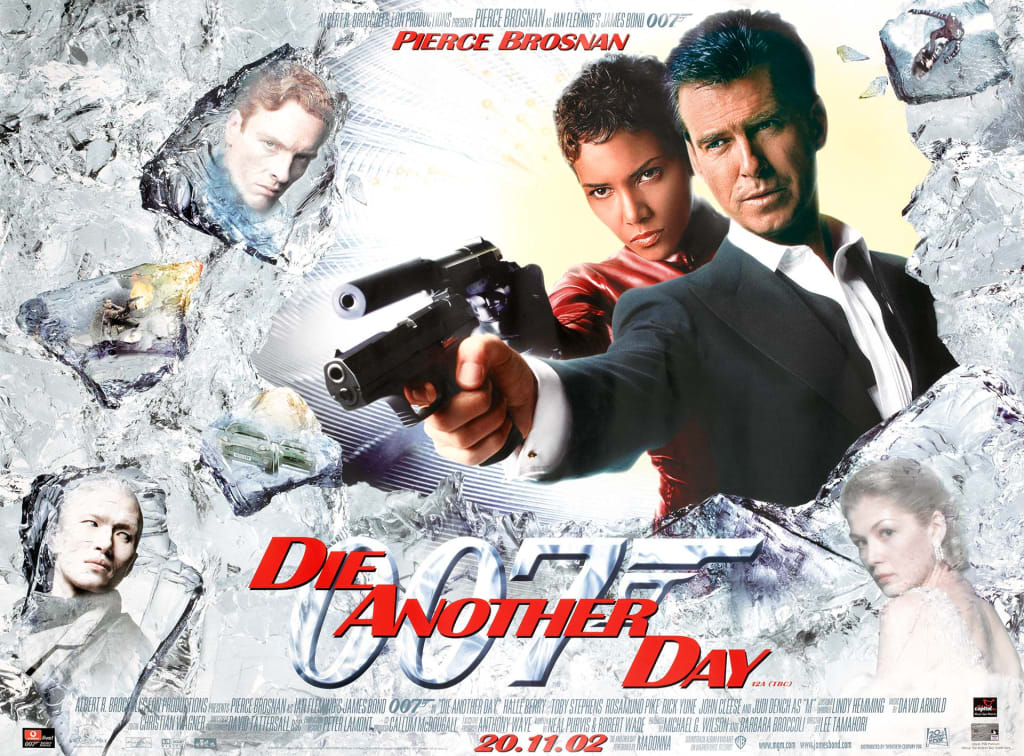
Few Bond films stoke quite the reaction that "Die Another Day" does. The final Bond film to feature Pierce Brosnan was controversial from its release in 2002, and has remained so in the twenty years since. Many fans take issue with a number of elements of this film, including, but not limited to: the plot, the characters, the direction, the acting, the product placement, the CGI, the humour and the gadgets. That's quite a list, sure, but, perhaps, "Die Another Day"'s problems stretch quite a bit deeper. As the first Bond film of the 21st century, "Die Another Day" should have shown how Bond could survive in a new and changing world, with a cinema landscape that was radically different to the one the franchise had emerged into forty years previously. Instead, it reignited the debate that had seemed to have been settled back in the early 90s about Bond being outdated, and that maybe it was time to move on from this 60s stereotype of British masculinity. And it is hard to argue that this film gives this impression: far from being a celebration of the franchise's forty year history, this film nearly kills that legacy by being pretty much a train wreck from beginning to end.
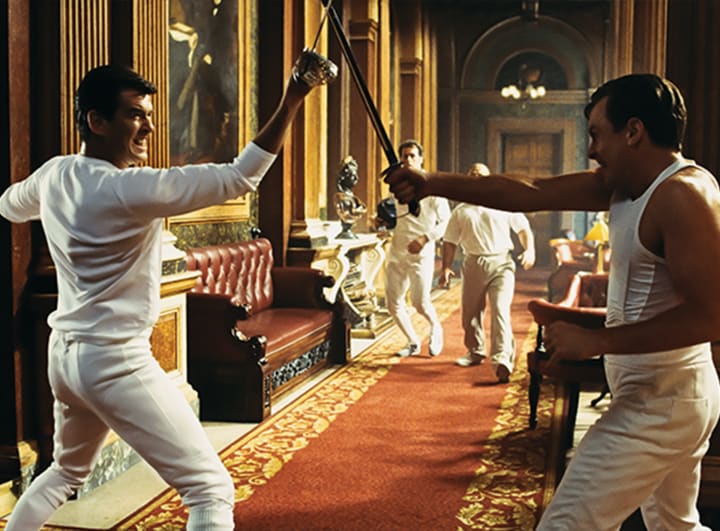
I suppose to really pick apart why "Die Another Day" is such a huge mis-step, we have to start at the beginning, and look at the plot. Opening with Bond on a mission in North Korea to kill a colonel trading in blood diamonds, the film quickly starts to show problems: the pre-titles sequence may have lots of set pieces, but there's no spark in them. The hovercraft chase across the Korean border peninsula should be loads of fun: it clearly wants to riff on the Thames boat chase from "The World is Not Enough", and even the ski sequences from "A View to a Kill" and "The Spy Who Loved Me", but it fails to be exciting in any way, and it ends up being one of the flattest pre-titles in the franchises' history - not so much getting the blood pumping as freezing it over completely. After that, we then go in a direction that the Bond franchise has never gone in before: Bond captured by a foreign power and tortured for information, while MI6 believes he has cracked under interrogation. While its not an avenue I personally would want to take Bond down (after all, the Bond franchise is meant to be fun, and these early scenes are the exact opposite), I think, had they had the courage of their convictions, this could have ended up being a very interesting Bond film. Sadly, however, this isn't the case, because fifteen minutes later, the film gets bored with mopey, imprisoned Bond, and instead falls back on the Brosnan Bond-era playbook. A billionaire who arouses the suspicions of M and MI6 - check. A villain who collaborates with a foreign power - check. A sinister henchman who has some kind of unique physical abnormality - check. A Bond girl who turns out to be another secret agent for another country - check. A huge satellite key to the villain's plan - check. Together with all the regular Bond tropes (the briefing, the gadgets, Q comedy and more), it amounts to perhaps the Bond film most lacking in originality. I get this was designed to celebrate 40 years of the franchise, but there's a fine line between affectionate call-backs and references, and slavish copying for copying's sake: this film is only able to do the later, and very often not the former. And it never really does the latter very well either: while other instalments in the franchise like "Thunderball" and "Diamonds are Forever" are pretty derivative of other Bond films, at least they recognise the need not to feel like a complete parody of the franchise. "Die Another Day" doesn't so much respect the traditions as tramples all over them: the hideous gun barrel sequence is just one example, the utterly ludicrous plot is another. If this was Austin Powers or Johnny English, I'd probably find this quite funny. After all, that's their whole point - to make fun of, first and foremost, James Bond. But James Bond should never, never, make fun of James Bond. Not like this. Subtle digs and nods to things are fine, but this flagrant mickey take just feels wrong. It doesn't help that this film feels ill-thought out, with huge leaps of logic made simply because the script needs it to. Why Graves needs to go to such extreme lengths to build a giant space laser is beyond me, but I suppose without them, there would be no film. And that would have been such a pity...

If the film's plot is utterly dreary and ill-thought out, then its characters are utterly vapid and hollow. I mean, they are just clichés, not designed to provoke any sort of response from the audience, just tell the story and appeal in a bland, mass-market, created-by-numbers way. It's hard to describe any defining features of any of them, because they're just so badly created. Gustave Graves is so obviously a villain, it makes one wonder why it took MI6 so long to cotton on. He makes Dr. Evil look subtle: all his lines are either quips, plot dumps or just proclamations about how evil he is. There's no depth to his motivations: while some Bond villains were only ever really sketched out in surface level detail, Graves is as transparent as glass, and just as boring. He's nothing more than an everyman version of a Bond villain: in fact, that's what every character is, they're simply an everyman version of tropes that crop up every now and again in the Bond series. If you were to ask someone who had never seen James Bond to describe the structure, basic plot and characters of a Bond film, chances are they would come up with this. It feels like a complete insult to the series, really, especially considering the great and deliberate steps some previous films (especially the Dalton and prior Brosnan films) had taken to improve its characters and the series' treatment of women and minorities especially. Sure, James Bond will never be a politically correct series: that is part of the appeal and the charm. But this film takes that to a whole new level. It's treatment of the female characters is bad enough (Jinx may be a competent agent, but often only when she's got next to nothing on, while Frost gets next to nothing to do once we find out she's allies with Graves), but this film's vilification of North Korea is borderline provocative. Oh, everyone in North Korea is a warmonger, and is hell bent on making the decedent West pay... for something or other, while the British and the Americans are the heroes. Give me strength. It's another demonstration of how old-fashioned this film looks. Added to that, the main villain turns out to be a whitewashed Korean general, and his main henchman has been disfigured by a diamond explosion, and you have the recipe for disaster. I just think, by this point, Bond had moved beyond pure stereotypes, and this film takes such a huge backward step in revelling in them. Not to mention the brazen shelving of the regular cast in thankless roles that could have literally been anyone. If you're expecting this film to do deep character work, then I'm afraid you're going to be very disappointed.

Sadly, this doesn't leave much room for the actors, who do the best they can against impossible odds, it seems. No one really stand out, I'm afraid to say, they just sort of struggle on until the end. Judi Dench is probably the strongest, and that's literally because she's Judi Dench. Her takedown of Michael Madsen's NSA boss is one of the film's funniest scenes, quite honestly. Halle Berry does the best she can with her ill-developed role, but her chemistry with Pierce Brosnan is pretty lacking, to be honest. Some of that is down to the script, undoubtedly, but I think there may have been something lacking in the direction as well. Toby Stephens may be as subtle as a brick, but that doesn't mean that his scenery chewing performance isn't absolutely delightful to watch, and does actually make this film almost slightly more bearable. It's a shame we don't get more from Rosamund Pike as Miranda Frost as well - the character may be pretty shallow, but Pike is brilliant in the role. She definitely has more chemistry with Brosnan, and, while the film doesn't really know what to do with her once we find out she was the mole, she does play evil deliciously well. I mentioned above how poorly the regular characters were treated by the script, and this extends to the actors. "Die Another Day" marked the final appearance of Colin Salmon and Samantha Bond in the franchise, as well as John Cleese's only full appearance as Q, and I'm afraid this film doesn't really do them justice. Salmon just stands around looking pensive, Bond is so badly treated by the script, it wouldn't have surprised me if she's just walked off the set one day, and, while Cleese is pretty good, Q only gets one scene, and it's little more than a greatest hits parade of all the other Q scenes. Sadly, no one else really stands out from the cast, thanks to paper thin roles and direction that's more interested in the action and the explosions than in anything they are doing. As for Pierce Brosnan, well he turns in a decent showing, but considering Bond's character in this film is so far removed from anything seen previously, it isn't a surprise that there's nothing for Brosnan to really grip onto. It's a shame that, like Connery and Moore before him, Brosnan's final hour is not his finest.
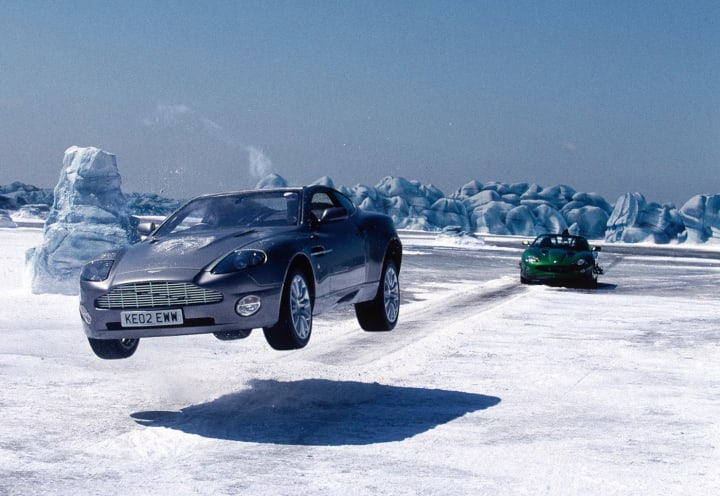
And then we come to another aspect of this film that is a major let-down: the production. Now, for a film that was made only 20 years ago, you wouldn't have expected this to have felt as dated as some earlier instalments of the Bond franchise. And yet, this film is so lathered in early 00s action clichés, it actually hurts. Poor CGI that the production team are convinced can do more than it actually can, slow motion dramatic shots, sudden jump cuts from a tracking shot to a close up: "Die Another Day" has it all. Director Lee Tamahori seems to think that keeping the camera and action in motion seems to make up for a story and character, and, while Bond has always had more of an emphasis on the big set pieces, it is usually accomplished with great technical skill, practical effects and strong editing. This, however, is the exact anthesis of this approach: it's lazy, slapdash and not even very well executed, and the end result is a film that has aged worse than some 80s and even 70s Bonds with regards to effects work. I mean, the invisible car is a stupid gimmick to start off with anyway, but it doesn't help when the effect is so obvious, it beggars belief as to why anyone can't actually see it. (Especially considering its mostly being driven on snow, meaning the car should be leaving tracks...) The Icarus laser beam effects look incredibly cartoony, once again establishing Bond as the franchise of dodgy space laser effects. But the ultimate example of CGI hubris in this film has to be the wind surfing sequence, which is just laughably terrible. Not only does it break the bounds of probability more than a Ford Mustang doing a perfect flip in the air, or a gondolier that transforms into a hovercraft, the sequence itself doesn't look convincing in the slightest. Tamahori seems to have the same approach to directing as Michael Bay: focus on the action, the product placement, the huge CGI set pieces and the girls, and never mind all this silly talk about plot and character. I keep coming back to these things because they are so sorely lacking, and anything that Tamahori seems to put in their place just feels hammy and tacky by comparison. His direction is all over the place, and it just makes this film full of stuff, without much really happening. All the things like set design and costume are great, but the way they are shot ruins any impact they may have. In fact, the only production element that escapes unscathed is David Arnold's score, which might actually qualify as one of the best in the franchise's history. A mix of modern synths and electric guitars and good, old-fashioned John Barry-esque pomp, this score actually injects some life into the film, and really pushes the drama in a way everything on screen isn't doing. It's a shame the music is undercut by that dreadful Madonna theme song, which easily distinguishes itself as one of the weaker James Bond theme songs by being utterly hollow and vapid. Sure, Madonna is a great singer, I don't deny it. But this was not her high period, creatively, and "Die Another Day", as a song, is a good reminder that not every artist is suited to every type of song.
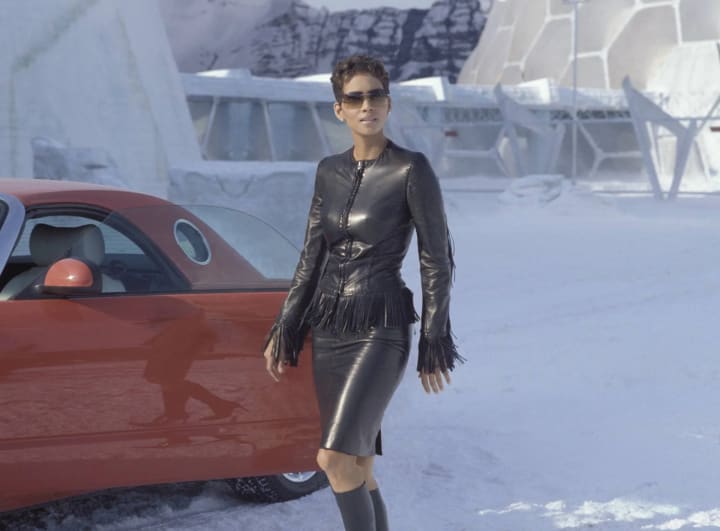
At the top of this feature, I commented upon how the problems with "Die Another Day" run deeper than just the surface level issues that most Bond fans bring up with regards to this film. The issues with "Die Another Day" stretch right into the cinema culture of the early 2000s, and what they thought audiences were looking for in a film. Because, while this film stands out by a country mile when viewed alongside the remainder of the Bond cannon, looked at in the wider context of the action/spy genre of the time, this depressingly fits with the tone of the films released around it. It seemed that, with the turn of the century, the spy/action genre became the target for spoof and ridicule (much like the superhero genre had been in the 1990s), no doubt inspired by the runaway success of the Austin Powers series. The problem was - there were so many carbon copies that they started to dilute the original sources. Things like Johnny English, Alex Rider and Spy Kids were ripping off the James Bond format so much, it was only natural that this was going to start to dilute Bond itself. And that's why we got "Die Another Day" - created because that's what the producers believed we wanted, and that's what would make them more marketable, and bring in more money. The whole film plays like one extended joke, except no one is laughing. You almost expect a laughter track to be running in the background, like some cheesy American sitcom. "Die Another Day" has no wit, no bite - it's just cheesy, jokey shlock. Everything is surface level: I understand that a lot of Bond films are as shallow as dishwater, but this film has nothing going on other than what you see on screen. It has been made purely for the purpose of generating income for those making it, and it ends up feeling like a soulless cash-in as a result. Ultimately, this feels like Bond was seriously lacking in direction and focus, something that, you could argue, had been coming since the mid 1980s. Ever since it looked like the Cold War between the USA and the USSR was coming to an end, the franchise had struggled to find a really strong hook for the series, and that is why, I think, a lot of the films were of such variable quality. You went from megalomaniacs hell-bent on world domination ("A View to a Kill" and "Tomorrow Never Dies"), to agent provocateurs, trying to shatter the fragile peace of the nuclear superpowers ("The Living Daylights" and "GoldenEye"), to basically petty gangsters and criminals ("License to Kill" and "The World is Not Enough"). This film decides that a whole other emerging superpower can be our villains, and, let's just say this went down like a cup of cold sick in Korea. It shows a complete lack of comprehension, and a desperation that the Bond films had to stay relevant. It's why the next film had to offer such a drastic course correction: because this way of making Bond films was completely unsustainable. People may critique the Daniel Craig films for a perceived 'lack of humour', but I would rather take a Bond film that maybe was a little bit too serious in places over this, with its complete failure to grasp even basic dramatic principles. That sounds really harsh, but, honestly, it is completely justified when this film is the way that it is.

I can say, quite honestly, that "Die Another Die" is, without doubt, the worst Bond film in the series, hands down. A plot with no real structure, characters that barely function as one-dimensional, let alone three-dimensional, and some of the worst direction ever in a Bond film, and this amounts to an absolute stinker. It's a shame as, while Pierce Brosnan was never my favourite James Bond, he deserved an much better swansong than this. It may have been a money-making Bond film (in fact, it was the highest grossing Bond film up to that point), but it isn't one that is looked back on with much fondness. And, I think the past 2900 words I've written on the subject make that perfectly clear. But the tide was changing. A few months prior, "The Bourne Identity" was changing the landscape of thriller, spy and action films - and it would have a profound effect on the Bond franchise. Together with the increasing tendency to reboot flagging franchises (both Doctor Who and Batman had critically acclaimed reboots around the same time), the stage was set for a whole new approach to the world's greatest super spy. And, for a new approach to James Bond, we would need a new James Bond. Someone who could carry the franchise properly into the 21st century, and reconnect with the public in the same way their predecessors had done. Enter Daniel Craig...
You can purchase "Die Another Day" on Blu-Ray from Amazon by clicking on the link below, and from all good Blu-Ray and DVD shops.

All pictures copyright to EON Productions. Thank you very much for reading.
JAMES BOND WILL RETURN...
About the Creator
Joseph A. Morrison
26. Fan of Doctor Who, Blake's 7, The Prisoner and more old-fashioned TV. Reviewer, wannabe writer and general twit.

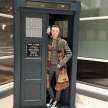
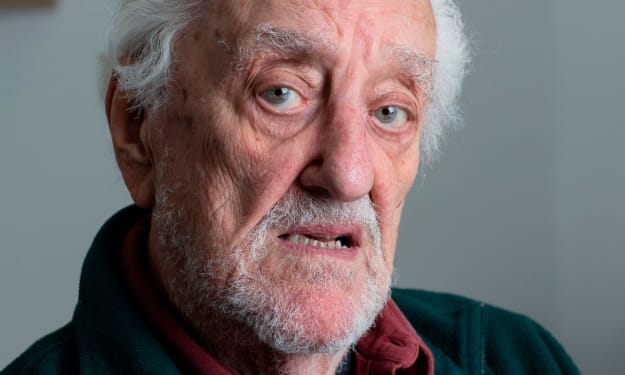



Comments (1)
👀👍👻🎃